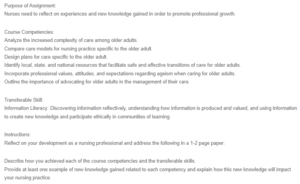Reflect on My Development
My routine practice enabled me to fulfill the stipulated core competencies. Firstly, I interacted with geriatric patients during my clinical rotation. I noted that these patients have the highest prevalence of comorbidities, polypharmacy, and neurological disorders such as Alzheimer’s Disease (McNabney et al., 2022). Secondly, I embraced and compared various models of nursing practice for geriatrics by collaborating with nurses in different units. Notably, total patient care was used in the general medical unit, whereas team nursing was used in the critical care unit. Thirdly, I designed a care plan for a geriatric patient with type 2 diabetes mellitus. Fourthly, I located national, state, and local resources for geriatric patients via online research and collaborating with the local authorities. Fifthly, I embraced justice, autonomy, beneficence, cultural unity, and open communication when caring for the geriatrics. Sixthly, I participated in training sessions whose theme focused on the relevance of patient engagement in the treatment process. Furthermore, I educated the patients (older adults) on the merits of their engagement in the process of care.
My clinical rotation enabled me to achieve the course’s transferable skills. In this context, the skill was information literacy. To achieve information literacy, I engaged in various activities involving research, critical thinking, using healthcare technology, and communication. I collaborated with an interdisciplinary research team by accessing online databases and the library. This entailed a sequential process that involved evaluating the credibility and reliability of sources and selecting the best evidence. We used research findings to formulate new evidence-based protocols to mitigate nosocomial infections. We embraced technology such as electronic health record systems. After that, we used therapeutic communication incorporating both verbal and non-verbal approaches to care for the patients (Gaylle, 2019). We embraced professional ethics and the provision of the Health Insurance Portability and Accountability Act in the use of technology (Moore & Frye, 2019).
This experience equipped me with pertinent knowledge to optimize my clinical practice. Regarding the complexity of care for geriatrics, I learned the unique needs of this population. This will promote holistic care. Regarding care models used in nursing, I learned that team nursing advocates for collaboration. This will enable me to work in concert with other healthcare providers.
Regarding care plans, I learned that nurses should develop individualized care plans to achieve patient-centeredness.
Regarding available resources, I learned that various organizations provide diverse services at the local, state, and national levels. This will form the basis for patient education. Regarding attitudes when caring for older people, I learned that nurses should embrace professional ethics and cultural unity. Lastly, I learned that patient engagement and autonomy would enable the elderly to participate in the treatment process.
References
Gaylle, D. (2019). In-simulation Debriefing Increases Therapeutic Communication Skills. Nurse Educator, 44(6), 295–299. https://doi.org/10.1097/NNE.0000000000000643
McNabney, M. K., Green, A. R., Burke, M., Le, S. T., Butler, D., Chun, A. K., … & Shega, J. W. (2022). Complexities of care: Common components of models of care in geriatrics. Journal of the American Geriatrics Society. https://doi.org/10.1111/jgs.17811
Moore, W., & Frye, S. (2019). Review of HIPAA, Part 1: History, protected health information, and privacy and security rules. Journal of Nuclear Medicine Technology, 47(4), 269–272. https://doi.org/10.2967/JNMT.119.227819
ORDER A PLAGIARISM-FREE PAPER HERE
We’ll write everything from scratch
Question

Reflect on My Development
Purpose of Assignment:
Nurses need to reflect on experiences and new knowledge gained in order to promote professional growth.
Course Competencies:
Analyze the increased complexity of care among older adults.
Compare care models for nursing practice specific to the older adult.
Design plans for care specific to the older adult.
Identify local, state, and national resources that facilitate safe and effective transitions of care for older adults.
Incorporate professional values, attitudes, and expectations regarding ageism when caring for older adults.
Outline the importance of advocating for older adults in the management of their care.
Transferable Skill:
Information Literacy: Discovering information reflectively, understanding how information is produced and valued, and using information to create new knowledge and participate ethically in communities of learning.
Instructions:
Reflect on your development as a nursing professional and address the following in a 1-2 page paper:
Describe how you achieved each of the course competencies and the transferable skills.
Provide at least one example of new knowledge gained related to each competency and explain how this new knowledge will impact your nursing practice.
Resources:
For assistance on creating a newsletter, please read the Library Answer for What is reflective writing and why is it important in nursing?


